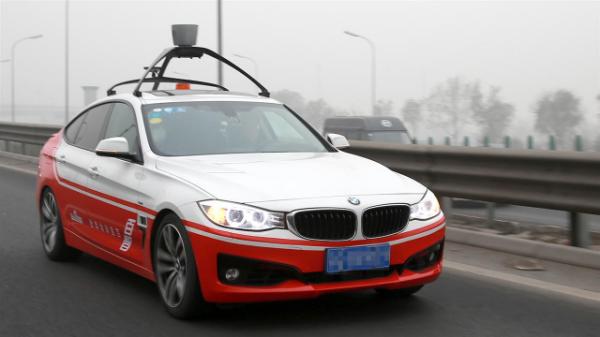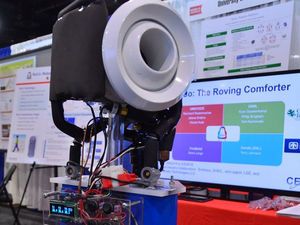20 automakers that sell vehicles in the US made a pact to make automatic emergency braking system a standard feature in new cars in less than a decade.



In a controversial move, Kuwait has passed a law making it mandatory for all its 1.3 million citizens and 2.9 million foreign residents to have their DNA entered onto a national database.
Anyone who refuses to submit their DNA for testing risks one year in prison and a fine of up to US$33,000, and those who provide a fake sample can be jailed for seven years.
The decision came after an Islamic State-led suicide bombing in Kuwait City on 26 June, which killed 26 people and wounded 227 more. The government hopes that the new database, which is projected to cost around US$400 million, will make it quicker and easier to make arrests in the future.

Nature News reports:
“Scrambling to respond to the success of Google DeepMind’s world-beating Go program AlphaGo, South Korea announced on 17 March that it would invest $863 million (1 trillion won) in artificial-intelligence (AI) research over the next five years [towards] founding of a high-profile, public–private research centre with participation from several Korean conglomerates, including Samsung, LG Electronics and Hyundai Motor, as well as the technology firm Naver, based near Seoul.”
President Geun-Hye emphasized that “artificial intelligence can be a blessing for human society” and called it “the fourth industrial revolution”
Historic win by Google DeepMind’s Go-playing program has South Korean government playing catch-up on artificial intelligence.

Baidu Inc. will soon start testing autonomous cars in the U.S., part of the Chinese tech giant’s effort to introduce a commercially viable model by 2018.
The move, disclosed by Baidu’s chief scientist Andrew Ng in an interview late Tuesday, is a significant step for the company, which is trying to get ahead in the race to build autonomous cars and is now calling on the resources of its Silicon Valley tech center to advance the effort. At the same time, Baidu is advocating for better coordination with the U.S. government, which the company says is necessary to get self-driving cars on the road.
Central to the push is Mr. Ng, an artificial-intelligence scientist who conducted groundbreaking research at Stanford University and at Alphabet Inc.’s Google. He’s also a co-founder of online-learning company Coursera Inc.

“Modern life relies on satellite sytems but they are alarmingly vulnerable to attack as they orbit the Earth. Patricia Lewis explains why defending them from hostile forces is now a primary concern for states”

EU Justice Ministers Claims Cyber Attackers are terrorists. I wouldn’t say all of them are terrorists. Those who attack hospitals, attack government infrastructures, threaten markets, etc, are terrorists. The next door neighbor’s 13 yr old kid hacking to use your wireless internet service; not a terrorist.
European Union justice ministers on March 11th adopted a general approach on the directive on combatting terrorism, including serious cyber crimes, informs LETA/BNS.
On Friday the council greed its negotiating position on the proposal for a directive on combatting terrorism. The proposed directive strengthens the EU’s legal framework in preventing terrorist attacks by criminalising preparatory acts such as training and travel abroad for terrorist purposes – hence addressing the issue of foreign fighters – as well as aiding and abetting, inciting or attempting such acts. It also reinforce rules on the rights for the victims of terrorism, the Ministry of Justice said.
Estonian Justice Minister Urmas Reinsalu said in a speech at the Justice and Home Affairs Council that for Estonia it is very important that justice ministers were able to agree on defining serious terrorist cyber attacks as terrorist crimes. This gives the EU additional legal tools in such situations as the cyber attacks that followed the so-called Bronze Night riots that took place in Tallinn in April 2007, he added.

“One small step for man, one giant leap for mankind.”
When Neil Armstrong stepped onto the dusty surface of the moon on July 20, 1969, it was a victory for NASA and a victory for science.
Backed by billions and led by NASA, the Apollo project is hardly the only government-organized science initiative to change the world. Two decades earlier, the Manhattan Project produced the first atomic bomb and restructured modern warfare; three decades later, the Human Genome Project published the blueprint to our DNA, heralding the dawn of population genomics and personalized medicine.

Innovative new project the MMTP aims to fast forward translation from lab to clinic with rapid, parallel mice testing. We caught up with Steve Hill and Elena Milova from the MMTP team to discuss the program and why being pro-actively involved with longevity advocacy is so important.
What’s the gap in the market you’re aiming to fill and the major motivation behind the MMTP?
Steve – The bridge between basic research and taking it to clinical trials. People like The SENS Foundation are spinning a lot of plates doing the high risk, nitty gritty research that isn’t profitable, but crowdfunding can get that done. We want to create a solid gold standard testing platform without the restrictions of government, where any team can come to us for parallel testing and halve development time. The problem with animal testing is there’s this disconnect; it’s not sexy science basically. A common response is let me know when it’s available in humans, but it’s not going to be! No animal data means no human testing, organizations like the FDA, NHS and EMA all insist on a battery of animal testing before human trials. Period. It’s not sexy, it’s not available in humans next week, but if MMTP or other projects don’t get things done on mice for example, it’s never going to get done. It doesn’t matter if one theory turns out to be wrong, let’s get stuck in and find out!

I do believe we’re within a 7 to 8 yr window at this point with Quantum hitting the broader main stream computing infrastructure. However, we have banks in Europe that have been using the technology for network communications, Los Alamos Labs experimenting since late 2011 with Quantum Internet, now China is launching their own Quantum Satellite for wireless communications; so I do suggest a strategy needs to be developed over the next 2 to 3 yrs for government & industry around how to manage & plan for deployment of Quantum especially with China & Russia’s interest.
New research demonstrating that quantum computing is now just an engineering challenge moves the possibility of encryption-cracking machines to the front burner.

Government’s other big NextGen Program “Advanced Research Projects Agency-EnergyAdvanced Research Projects Agency-Energy” (ARPA) is funding a personal climate change solution with robots, foot coolers, etc. There is one fact; US Government does love their acronyms.
Why heat or cool a whole building when you could heat or cool individual people instead?